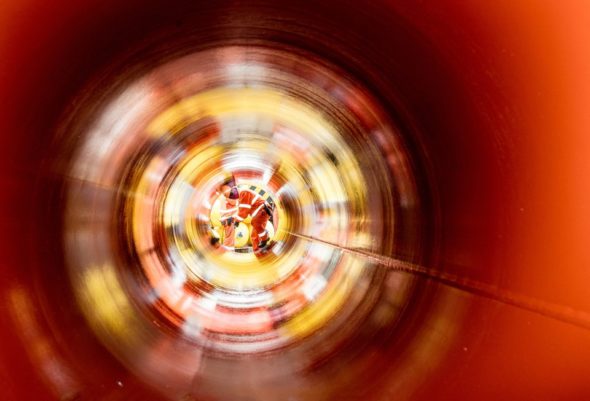Nord Stream 2 pipeline, though completed is nowhere near delivering gas to the EU and involved in several legal battles in EU and German Courts that can affect the bankability of the project. The latter is acknowledged by the project promotors themselves – writes Wojciech Jakóbik, BiznesAlert.pl editor in chief.
Recent judgment of the Higher Regional Court of Düsseldorf delivers interesting food for thought. Nord Stream 2 AG argued that it would face a risk of bankruptcy, if its controversial pipeline is to operate in full compliance with EU’s energy regulations.
The court while upholding the Federal Network Agency (BNetzA) decision to reject Nord Stream 2 AG derogation from provisions of the EU’s Third Energy Package, was clear that derogation in this particular case is a gateway for market manipulation.
„The complainant apparently does not want a transparent mechanism for determining the network charges. Either there is the alleged need for a further gas connection line through the Baltic Sea, then a source-based financing by means of regulated network charges will ensure that the investment is amortized. Or the transport costs should be “artificially” calculated to be small in order to be able to enter the European wholesale market at better conditions at the exit point of Nord Stream 2 than at exit points that would be reached through gas connection lines, the operators of which paid regulated fees. However, this would be a distortion of competition.”
Therefore, not only was the Düsseldorf court deprived of delusions about possible market practices, but also had full clarity of the purposes they might serve. Possibility of distortion of competition in order to increase competitiveness of the project was not acceptable to the Court that clearly stated:
“There is great public interest in regulating gas interconnections from third countries to regulate competition and ensure security of supply. The complainant’s opposing interest in not being subjected to regulation must take a back seat. There is also the possibility to operate at a profit within the framework of grid regulation. The implementation of unbundling regulations in Germany has shown that the implementation of these requirements is possible and does not lead to the bankruptcy of companies.”
Therefore, the Court was not intimidated also by the alleged perspective of bankruptcy:
“The submitted [by Nord Stream 2 AG] report on the alleged risk of bankruptcy could not even be checked for plausibility, as it was blackened.” […]“In view of the now alleged impending insolvency – possibly due to the unbundling requirements – it would have made sense to stop the Nord Stream 2 project and not even start building the pipeline.”
Still, the question about the reality of bankruptcy remains. According to Nord Stream 2 AG official communications, the pipeline’s capital investment will reach €9,5-10 billion. This makes it one of the most expensive gas infrastructure projects in Europe. Moreover, the delays, sanctions and the necessity to adapt to external circumstances could have only increased the whole value of the project.
As Nord Stream 2 AG blackened the circumstances, all that can be said about them is that they can be traced back to Gazprom strategy that requires non-application of EU law.
While Nord Stream 2 AG started off as a consortium of six companies (Gazprom, Shell, OMV, Engie, Uniper i Wintershall), it ended up, in reaction to the Polish competition authority’s decision blocking creation of Nord Stream 2 AG as a JV, as a fully Gazprom owned company with five lenders. The real question at hand is about the conditions for further cooperation between Nord Stream AG/Gazprom and their partner companies. Given the risks of the project, there is the possibility that those conditions include high interest rates on capital provided by financing parties. Acting as external partners to the project, Shell, OMV, Engie, Uniper i Wintershall might have had to limit their risk exposure and put in place certain constrains on the borrower.
Given the price tag and other circumstances like costs of capital, Nord Stream 2 AG might find itself between a rock and a hard place. If it pushes for reflection of its full costs in transmission tariff, not only will it have difficult time competing with other routes of Russian gas transit to Europe, but – more importantly – it will be challenged by the German regulator, BnetzA, which might be hesitant to push all the burden on gas consumers. If, however, the company slashes its transmission tariff in order to remain competitive and/or to satisfy BNetzA, it may end up with lower revenues than expected and required to pay off its liabilities. Flexibility to manipulate the tariffs would be the key answer to that dilemma.
In this case we face more questions than answers. Is Nord Stream 2 AG’s financial stability really in danger? Or did the company only mislead the Court in order to sway judges to its argument? If the latter is true, the question of accountability of Nord Stream 2 AG management and legal advisors may arise. Are the financing parties of Nord Stream 2 AG, i.e. Shell, OMV, Engie, Uniper, Wintershall, aware of the report „on the alleged risk of bankruptcy” mentioned in the Court’s ruling? How does this fact affect their willingness to further finance the project? Are they considering any impairments on loans granted to Nord Stream 2 AG?
Those issues should be of interest to the public and to the gas consumers in the EU and in particular in Germany. But mainly they should be of interest to the Commission competition services as well as national competition watchdogs and finally BNetzA, which is in the middle of certification procedure.









